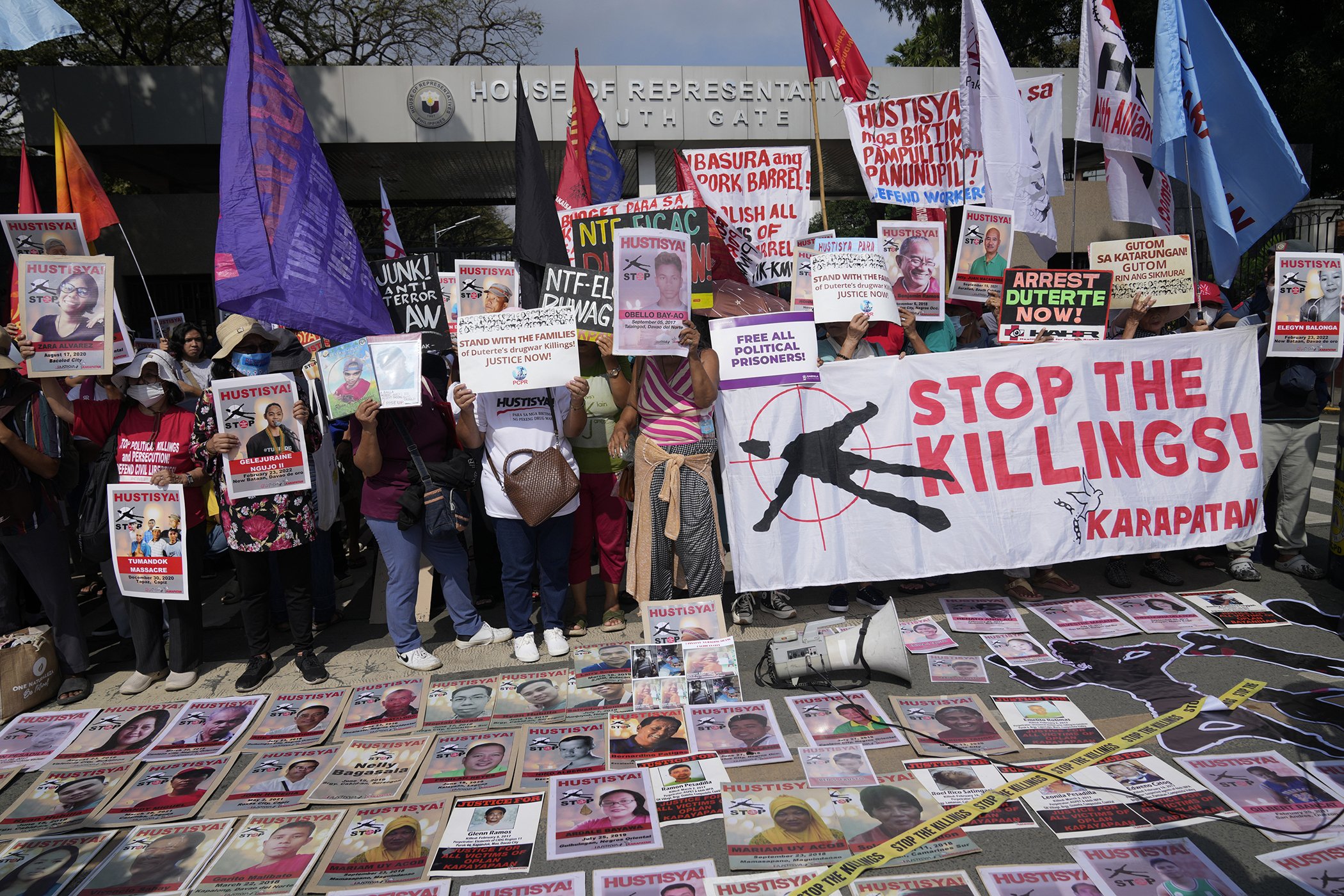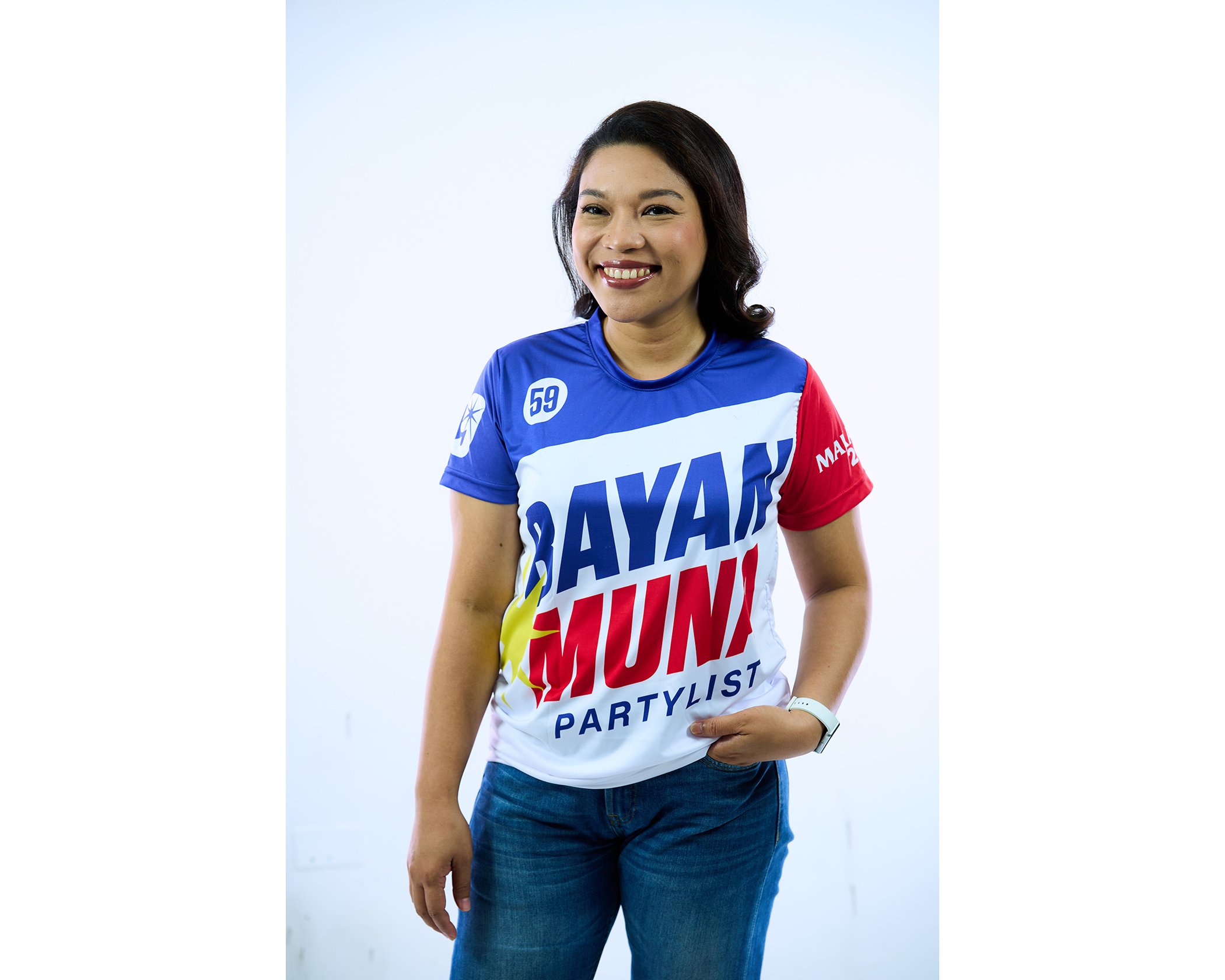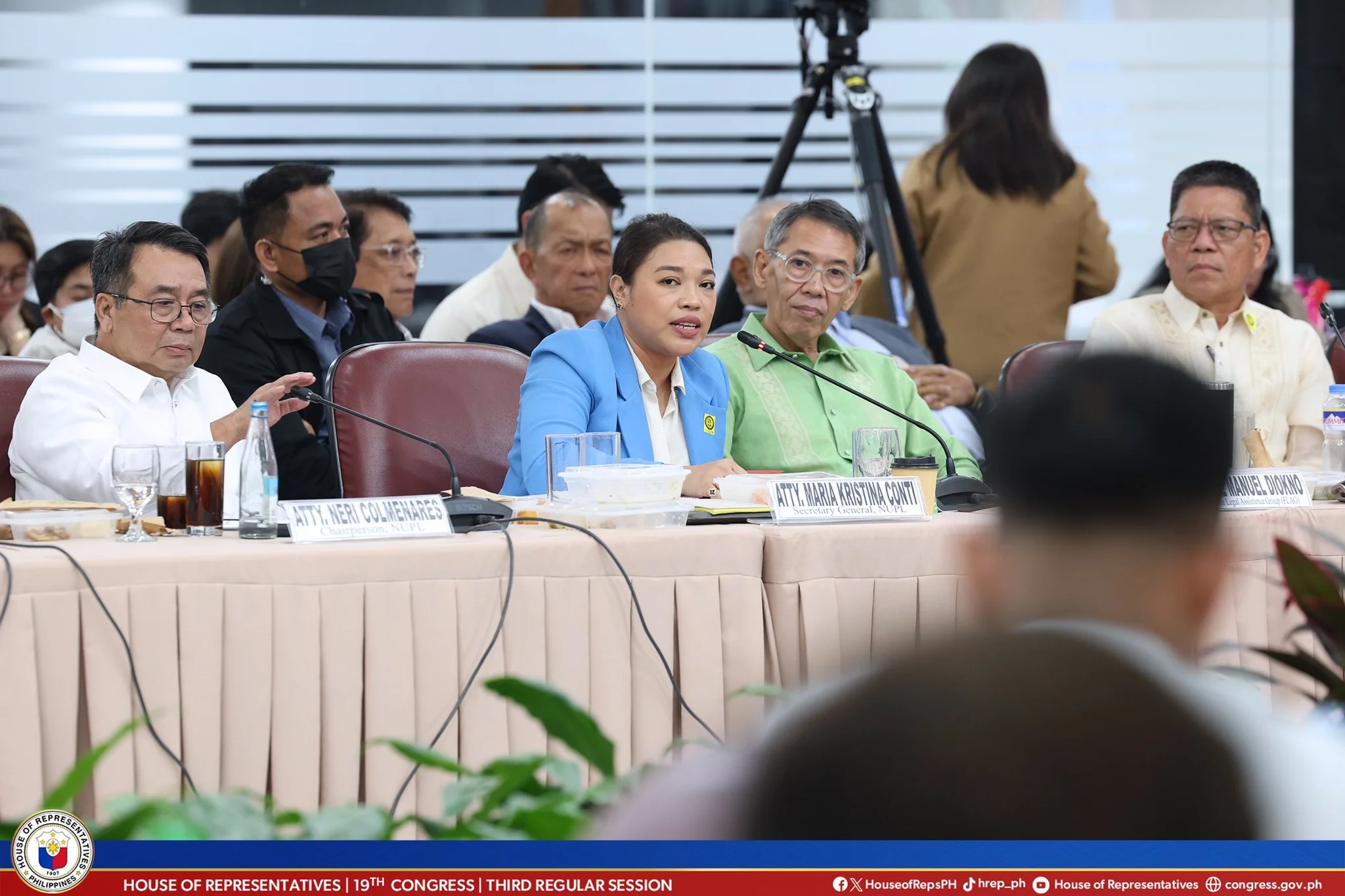In its 2024 People Under Attack report, CIVICUS listed the unsubstantiated arrest and detention of activists, red-tagging, and death threats as the root of the Phillippines’ repressed civic space rating
In this challenging and often dangerous environment, Kristina Conti is a human rights lawyer who also works as secretary-general of a regional chapter of the National Union of Peoples’ Lawyers. In her own words, Conti shares how she decided on a law career, after a career in journalism, and how the law is crucial for supporting activists in the Philippines.
I am an activist in the Philippines, I also happen to be a lawyer.
My name is Kristina Conti, and I work on cases involving human rights violations committed against marginalized and disempowered individuals — especially by state actors. More recently, I have represented victims of the “war on drugs” in the Philippines.
The term “war on drugs,” often used by President Duterte and the media, is a misnomer. It was not a war but a massacre — and not against drugs, but against the poor. This term has been adopted in some legal proceedings, including at the International Criminal Court, where I engage with the current investigation and represent some victims. The “war on drugs” encompasses a range of policies, actions, and consequences stemming from Duterte’s pronouncement that he would eradicate drugs in the Philippines.
 Relatives of drug war and extrajudicial killing victims and activists hold a protest outside the House of Representatives in Quezon City, Philippines on Dec. 4, 2024.
Relatives of drug war and extrajudicial killing victims and activists hold a protest outside the House of Representatives in Quezon City, Philippines on Dec. 4, 2024.
Over the past 20 years, I have tried to help make things better through my work and advocacies. I currently serve as the secretary-general of the National Union of Peoples’ Lawyers in the National Capital Region.
I began as a student activist in 2001 and remained engaged in community work while seeking purpose. I briefly worked as a journalist before training as a people’s lawyer, all while maintaining my connection to the national democratic movement.
I had a typical 90s childhood…
…I went to school in the city and spent summers in the province. I have two sisters, two brothers, a handful of cousins, and dozens of neighbors and friends, so there was always plenty of play. But as the eldest Asian daughter, I also had many responsibilities.
When I was 13, my father passed away. Around the same time, my mother was just beginning her private law practice as a woman in a male-dominated field. Now, as I near the age at which my father passed, I am constantly reminded of life’s order of priorities — to uplift family above all.
Through the years I’ve been shown that the family you are born into and the family you choose are very defining. I am privileged to have been surrounded by exemplars of feminine strength, grace, and dignity.
My generation played outdoors, but we were introduced to the virtual world as it was opening up. I remember tinkering with WordStar and Lotus 1-2-3, saving files on floppy disks. We are technically digital natives, brought up with a keen awareness of the possibilities and limitations of being offline and online.
My generation has consistently had to keep up with exponential change. Politically, the Philippines has seen so much in the past 50 years. I was a toddler when Filipinos came together to force the dictator Ferdinand Marcos, Sr. out of power. Fast forward 15 years, I was a college freshman when I went to the streets to clamor for the ouster of another corrupt president Joseph Estrada.
My coming of age is familiar — an awakening and radicalization because of the circumstances – but a curious example as well of how small personal choices create a movement.
My first impression of lawyers was of my mother…
…a lawyer who first worked as court staff and later as a public attorney.
I wasn’t conditioned to see only high-flying city lawyers; she had clients in prison, and I remember one family trip where we stopped at the penitentiary along the way. She was paid in bananas, fish, and trinkets. So to me, being a lawyer wasn’t necessarily glamorous — it meant hard work, intelligence, and resourcefulness. But I didn’t consider becoming a human rights lawyer until later in college.
I thought I would either end up as a biology teacher at my high school or an anesthesiologist — probably because one of my grandaunts was one. For context, in secondary school, I had been offered a slot in a science high school, the best in the country, with an automatic scholarship. I had to take a science course in college, for which I also secured a scholarship. My original course was Molecular Biology and Biotechnology, but even if I may have had the aptitude, I didn’t have the interest.
After much deliberation, I eventually shifted to and graduated with a degree in Journalism, where I was happier exploring things I could see without a microscope. I relished the unpredictability of life as a reporter, the power of my words to shape discussions, and their potential to influence and create nationwide impact.
In 2006, a friend disappeared with a fellow student, potentially taken by military agents.
They had committed to full-time community work in the rural area. In 2007, the Supreme Court of the Philippines was alerted and looked into cases of extrajudicial killings and enforced disappearances, and offered the judicial remedy of the writ of amparo. I went to law school in 2008, with enthusiastic and financial support from my mother — it was her same law school — but partly because I knew I wanted to help my friend and other desaparecidos.
On the first day of law school, they ask you what kind of lawyer you want to be. I have always known I didn’t want to be a corporate or firm lawyer. I would answer then that I saw myself doing litigation and dabbling in human rights. After I was acquainted with the National Union of Peoples’ Lawyers in 2009, I would more confidently say that I wanted to be a people’s lawyer.
 Kristina Conti poses for a portrait for Bayan Muna, a political party-list in the Philippines.
Kristina Conti poses for a portrait for Bayan Muna, a political party-list in the Philippines.
A beautiful confluence of events and circumstances led me to where I am now.
It has allowed me to work on pressing, high-profile human rights cases, with my group at the forefront of the movement. I have done criminal defense for "enemies of the state," handled suits and countersuits for civil society leaders, and challenged the constitutionality of major laws. I have been privileged to be in the right places, at the right times, to help others resist the immense powers of an abusive state. I hope to remain here, where I can continue to help others more.
My work as the secretary-general of a regional chapter of the National Union of Peoples’ Lawyers…
… encompasses litigation, administrative coordination, and event organization on a regular basis. The National Union of Peoples' Lawyers (NUPL) is a voluntary human rights organization composed of legal practitioners.
In terms of issues, I am the point person on the "war on drugs"
…and crimes against humanity committed under former President Rodrigo Duterte, and on matters regarding the International Criminal Court, as I am registered in the court as assistant to counsel.
The NUPL is a leading human rights organization in the Philippines, recognized as one of the pillars of public interest lawyering. It was formed in 2007 as a response to the worsening and unforgiving situation in the time of former President Gloria Macapagal-Arroyo. At that time, lawyers and judges were being killed at alarming rates, and in brazen fashion. NUPL grew as a form of resistance against state repression and a show of solidarity within the sector and other sectors of society.
There are deep underlying problems in the Philippines — seen as a backward and semi-colonial country — that have aggravated divisions across classes, beliefs, and interests. The problem is also with the people, especially those in government and those elected by the populace at large who have been short-sighted or selfish — or both. There have been very few visionaries who have pushed for a genuine and systemic overhaul, for an independent and equitable society.
The NUPL hopes to be changemakers and part of the solution, to remedy issues of access to justice of the marginalized sectors of society, but ultimately, to balance the scales so that, as the adage goes: “Those who have less in life will have more in law.”
One of the substantial threats to activists in the Philippines is vilification.
This happens in the form of “red-tagging” or baseless and malicious labeling as a communist.
It has been particularly pervasive in this era of disinformation. However absurd, these kinds of individualized and unsubstantiated attacks are intended to diminish advocacies and silence dissent.
I have been the target of such a campaign, I was made respondent in a case alleging recruitment into a rebel army, mocked in the media as a paid lackey, and claimed to be a covert operator of the communist armed movement undermining the government. The former spokesperson of the anti-insurgency task force has even called for the revocation of my passport, largely to disable me from participating in peace negotiations held abroad. I have often identified with the causes of my clients, even as I carry my own separately.

These attacks can be precursors to extra-judicial killings, enforced disappearances, surveillance, and acts of harassment and intimidation, which are connected to a policy against alleged insurgents and rebels. The practice of criminalization of political crimes also poses potential criminal charges, such as terrorism charges with the false equivalency that activists are communists, and must be terrorists.
An established culture of impunity also certifies that the Philippines is a dangerous place for lawyers, especially those who challenge policy or government action. Every day brings new anxieties and struggles for human rights lawyers here.
Activists in the Philippines and everywhere else need support and solidarity.
We welcome all types of support — financial, logistical, social, moral, and informational—to further develop our work on the ground. We are grateful for the wide array of supporters we have, ranging from local organizations to international non-governmental organizations and supranational entities.
Lawyers also need specific professional and personal support. Networking within the framework of a national and international legal order, and benchmarking human rights standards is a key element for sustainable transformation. In particular, human rights lawyering in the Philippines is a thankless and endless job. Given the exceptional stress in this kind of work, I see wellness and self-care as imperative. It is always easy to resign to problems being perennial, so it is sublime to be able to renew and cultivate optimism.
Of course, mutually beneficial relations with communities, people’s organizations, and the broader mass movement validate our work in human rights. Our clients are oftentimes intended victims of the system or circumstances, and it takes so much to rise above it all.
Acceptance of our alternative politics and the mainstreaming of grassroots law will greatly boost the impact of our work.
Practical support allows us to carry on day-to-day, but the solidarity of like-minded people and groups is also crucial in establishing and clutching footholds for social progress. We urge to protect and empower activists and to echo and magnify advocacies on a global scale.
Corollary, we must support people’s organizations that represent and distill their own democratic rights, interests, and welfare. As lawyers, we can go further when our clients can. We rely on their strength and are humbled by wisdom. Fittingly, brave clients deserve brave lawyers.
This article, as narrated to Gugulethu Mhlungu, has been slightly edited for clarity.
If you want to contact and explore supporting Kristina and the NUPL, visit the NUPL website at nupl.net. On Facebook and X the handle is @nuplphilippines. The group may be reached through the email address nupl2007@gmail.com, and specifically Kristina’s chapter NUPL-NCR through nuplncr@yahoo.com.
The 2024-2025 In My Own Words Series was made possible thanks to funding from the Ford Foundation.